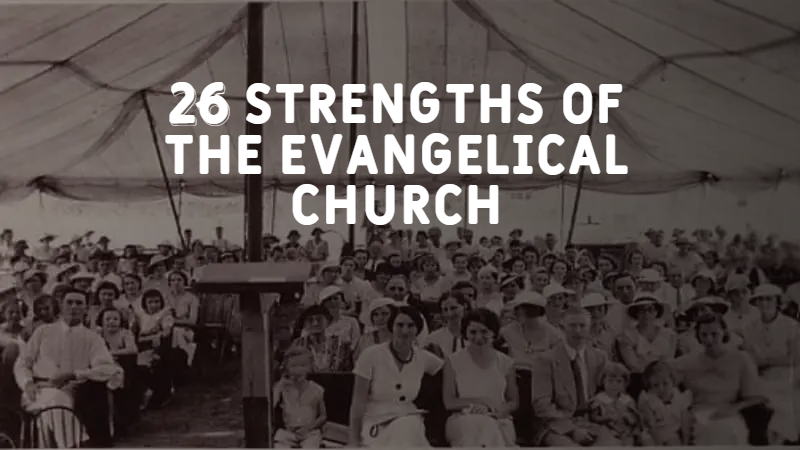While negative aspects of evangelicalism emerge quite easily due to its diverse expressions, sometimes we are left with an image less than flattering and under the impression that evangelicalism is about to give up the ghost.
The reality, however, is quite different. By “evangelical,” I include churches that affirm the supreme authority of Scriptures and believe in the classic Christian doctrines of the Creeds.
Recently, I wrote about 26 weaknesses of the evangelical church; so, here are 26 strengths of the evangelical church that we need to be grateful for in the midst of our critiques:
a) It has a zeal for propagation. However opposed one may be to certain methods of evangelicalism, the evangelical church continues to thrive in our day and grow numerically, especially among faithful, Bible-believing congregations.
b) It preserves ol’ time religion. It has no interest in following progressive agendas for the church but in preserving the free offer of the Gospel as articulated in the Scriptures.
c) It strongly opposes sexual visions contradicting God’s view of man and woman. It roots its premise in Genesis 1, not on modern sexual mythologies.
d) It promotes male leadership in the Church. I know this is not thrilling for many on the left, but the way forward is through qualified liturgical males.
e) It opposes Roman Catholic paradigms, which elevate hierarchy and tradition above biblical authority and add unbiblical rituals to the church (see my post on cranky Protestantism).
f) It preaches about the atonement and vindication of Jesus frequently.
g) It is not afraid to confront scientism and liberalism before and after the COVID era.
h) It produced one of the greatest evangelists in the history of Christendom, namely, Billy Graham, whose crusades drew thousands, if not millions, of people to Christ.
i) It has a high view of the Spirit’s work in the saint’s life.
j) It produced one of the most prolific hymn writers in Christian history, namely, Fanny Crosby, whose hymns still bear witness to the life of Jesus and minister to millions in church and is remembered and sung by the aged in nursing homes with greater frequency than any other hymn-writer.
k) It was bold to break from liberal mainline churches when many encouraged them to stay (see the PCA in 1973).
l) It defends vehemently the inerrancy and infallibility of the Bible in an age of competing authorities.
m) It upholds classic Christian moral issues such as the dignity of life from conception to death.
n) It is driven by a vision of preserving or conserving the Classical and Western Christian heritage.
o) It cherishes personal piety and a life of devotion.
p) It encourages a personal relationship with Jesus.
q) The modern evangelical movement has also produced capable biblical expositors.
r) It has popularized classic Reformed doctrines like the sovereignty of God and his glory (see John Piper and R.C. Sproul’s works).
s) It has, by and large, preserved a historical understanding of the creation account. While the 6-day creation was and is mocked by elite academicians, it is still preserved among most evangelical bodies.
t) Seminaries and many alternative training models continue to produce well-trained scholars and faithful pastors.
u) Evangelicals treasure experience (consider testimonials). Perhaps they overemphasize this dimension while some underemphasize the existential perspective (to quote John Frame).
v) Evangelicals believe in the power of prayer to change things.
w) Evangelical preaching is story-oriented and narratival; intended to keep your attention, while much preaching in our day is overly technical and unreliable.
x) To be evangelical is to be the people of Christ, a people given over to the Evangel in its pure and unadulterated form.
y) To be evangelical is to not be ashamed of the Gospel. By and large, we have not succumbed to the academy’s embarrassment of the message of the cross.
z) In sum, the strength of evangelicalism is its disposition toward Gospel truth.
While there are many issues deserving of footnotes and further explanations (consider the infiltration of woke and racial ideologies), evangelicalism still offers plenty of strengths and needs to be encouraged, even when we may not share identical sociological and theological commonality on every point.
I remain grateful for the evangelical church’s pure expression and hope to see it flourish even more in our day.















